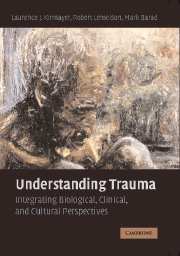Book contents
- Frontmatter
- Contents
- List of Figures
- List of Tables
- List of Contributors
- Foreword by Robert Jay Lifton
- Preface
- List of Abbreviations
- Introduction: Inscribing Trauma in Culture, Brain, and Body
- SECTION I NEUROBIOLOGICAL PERSPECTIVES ON TRAUMA
- SECTION II CLINICAL PERSPECTIVES ON TRAUMA
- SECTION III CULTURAL PERSPECTIVES ON TRAUMA
- Epilogue: Trauma and the Vicissitudes of Interdisciplinary Integration
- Glossary
- Index
SECTION I - NEUROBIOLOGICAL PERSPECTIVES ON TRAUMA
Published online by Cambridge University Press: 27 July 2009
- Frontmatter
- Contents
- List of Figures
- List of Tables
- List of Contributors
- Foreword by Robert Jay Lifton
- Preface
- List of Abbreviations
- Introduction: Inscribing Trauma in Culture, Brain, and Body
- SECTION I NEUROBIOLOGICAL PERSPECTIVES ON TRAUMA
- SECTION II CLINICAL PERSPECTIVES ON TRAUMA
- SECTION III CULTURAL PERSPECTIVES ON TRAUMA
- Epilogue: Trauma and the Vicissitudes of Interdisciplinary Integration
- Glossary
- Index
Summary
In recent years, neuroscience has gone a considerable distance toward unraveling some of the mechanisms of learning, memory, and emotion. Such research has also identified some of the processes that come into play in response to threat, fear, and injury. The contributors to this section present converging lines of research on behavioral, neurophysiological, and molecular mechanisms that may contribute to the response to trauma. These include studies of the neural mechanisms of fear learning and extinction, the role of gene–environment interactions in the development of normal and pathological stress responses, and the pathological effects of stress and trauma on brain and body. Recent progress in these fields has been nothing short of breathtaking, and this section presents only a sampling of the field, albeit a sample that captures findings of great relevance to the study of trauma and to the treatment of its psychological effects. The chapters in this section demonstrate both the power and the limitations of the scientific method as it approaches the complexity of human behavior.
Fear and defensive reactions serve obvious adaptive functions in all animals, and humans share this evolutionary heritage. Both normal and pathological responses to traumatic events can therefore be understood in part in terms of the functioning of these adaptive systems. Vinuta Rau and Michael Fanselow discuss how animals' responses to the threat of a predator provide a window on fear-related behavior. They explain the varieties of the fear response using a model of “predatory imminence.”
- Type
- Chapter
- Information
- Understanding TraumaIntegrating Biological, Clinical, and Cultural Perspectives, pp. 21 - 26Publisher: Cambridge University PressPrint publication year: 2007



